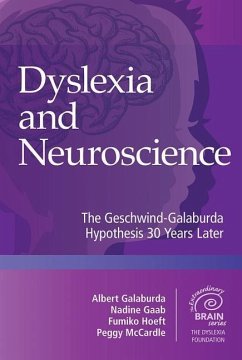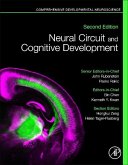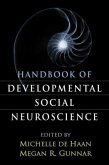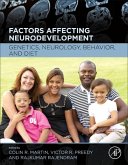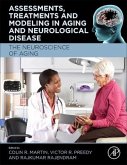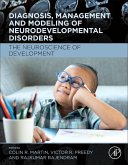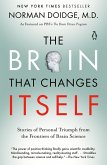Dyslexia and Neuroscience
The Geschwind-Galaburda Hypothesis 30 Years Later
Herausgeber: Galaburda, Albert M; McCardle, Peggy; Hoeft, Fumiko; Gaab, Nadine
Dyslexia and Neuroscience
The Geschwind-Galaburda Hypothesis 30 Years Later
Herausgeber: Galaburda, Albert M; McCardle, Peggy; Hoeft, Fumiko; Gaab, Nadine
- Gebundenes Buch
- Merkliste
- Auf die Merkliste
- Bewerten Bewerten
- Teilen
- Produkt teilen
- Produkterinnerung
- Produkterinnerung
This 15th volume in the Extraordinary Brain Series critically examines research in dyslexia and neuroscience in response to the Geschwind-Galabura hypothesis that defined the field of dyslexia 30 years ago.
Andere Kunden interessierten sich auch für
![Neural Circuit and Cognitive Development Neural Circuit and Cognitive Development]() Neural Circuit and Cognitive Development244,99 €
Neural Circuit and Cognitive Development244,99 €![Handbook of Developmental Social Neuroscience Handbook of Developmental Social Neuroscience]() Handbook of Developmental Social Neuroscience146,99 €
Handbook of Developmental Social Neuroscience146,99 €![Factors Affecting Neurodevelopment Factors Affecting Neurodevelopment]() Factors Affecting Neurodevelopment271,99 €
Factors Affecting Neurodevelopment271,99 €![You and Me: The Neuroscience of Identity You and Me: The Neuroscience of Identity]() Susan GreenfieldYou and Me: The Neuroscience of Identity17,99 €
Susan GreenfieldYou and Me: The Neuroscience of Identity17,99 €![Assessments, Treatments and Modeling in Aging and Neurological Disease Assessments, Treatments and Modeling in Aging and Neurological Disease]() Assessments, Treatments and Modeling in Aging and Neurological Disease271,99 €
Assessments, Treatments and Modeling in Aging and Neurological Disease271,99 €![Diagnosis, Management and Modeling of Neurodevelopmental Disorders Diagnosis, Management and Modeling of Neurodevelopmental Disorders]() Diagnosis, Management and Modeling of Neurodevelopmental Disorders271,99 €
Diagnosis, Management and Modeling of Neurodevelopmental Disorders271,99 €![The Brain That Changes Itself The Brain That Changes Itself]() Norman DoidgeThe Brain That Changes Itself17,99 €
Norman DoidgeThe Brain That Changes Itself17,99 €-
-
-
This 15th volume in the Extraordinary Brain Series critically examines research in dyslexia and neuroscience in response to the Geschwind-Galabura hypothesis that defined the field of dyslexia 30 years ago.
Hinweis: Dieser Artikel kann nur an eine deutsche Lieferadresse ausgeliefert werden.
Hinweis: Dieser Artikel kann nur an eine deutsche Lieferadresse ausgeliefert werden.
Produktdetails
- Produktdetails
- Verlag: Brookes Publishing Company
- Seitenzahl: 240
- Erscheinungstermin: 23. Oktober 2017
- Englisch
- Abmessung: 231mm x 155mm x 18mm
- Gewicht: 440g
- ISBN-13: 9781681252254
- ISBN-10: 1681252252
- Artikelnr.: 48256419
- Herstellerkennzeichnung
- Libri GmbH
- Europaallee 1
- 36244 Bad Hersfeld
- gpsr@libri.de
- Verlag: Brookes Publishing Company
- Seitenzahl: 240
- Erscheinungstermin: 23. Oktober 2017
- Englisch
- Abmessung: 231mm x 155mm x 18mm
- Gewicht: 440g
- ISBN-13: 9781681252254
- ISBN-10: 1681252252
- Artikelnr.: 48256419
- Herstellerkennzeichnung
- Libri GmbH
- Europaallee 1
- 36244 Bad Hersfeld
- gpsr@libri.de
Albert M. Galaburda, M.D., is a cognitive neurologist at Beth Israel Deaconess Medical Center and, since 1995, the Emily Fisher Landau Professor of Neurology (Neuroscience) at Harvard Medical School. In addition, he serves as Director, Office of Diversity, Inclusion, and Career Advancement at BIDMC and as Co-director, Mind, Brain, and Behavior Interfaculty Initiative at Harvard University. Dr. Galaburda is a native of Chile and a graduate of Boston University's Six-year Liberal Arts-Medicine Program (1971). After medical school he trained in Internal Medicine and in Neurology at Boston City Hospital (now Boston Medical Center). From 1979 until 2015, he directed a NIH-funded bench laboratory on the fundamental causes of learning disorders, especially language based learning disabilities, and from 1992 until 2015, he directed the Division of Cognitive Neurology at BIDMC. He has written extensively on cerebral lateralization and on dyslexia. He has published more than 230 original articles, reviews, book chapters and books, and has lectured extensively locally, nationally and abroad on the general field of cognitive neurology. He has also been recognized for his work with several prizes, including the Pattison Prize in Neuroscience, the IPSEN Prize in Neural Plasticity, the American Academy of Neurology Decade of the Brain keynote speaker award, the Behavioral Neurology Society of the AAN's Lifetime Achievement Award, the International Dyslexia Association's Samuel T. Orton Award, and others. Since January of 2015, Dr. Galaburda devotes half of his time to diversity and inclusion, as well as the career advancement of students and physicians underrepresented in medicine. Nadine Gaab, Ph.D., Associate Professor of Pediatrics, Boston Children's Hospital/Harvard Medical School, Department of Medicine/Division of Developmental Medicine, Laboratories of Cognitive Neuroscience, 1 Autumn Street, Boston, Massachusetts 02115. Nadine Gaab is an associate professor of pediatrics at Boston Children's Hospital/Harvard Medical School and a faculty member at the Harvard Graduate School of Education. Her current research focuses on auditory and language processing in the human brain and its applications for the development of typical and atypical language and literacy skills. The Gaab Lab is currently working on various topics with a main focus on early identification of developmental dyslexia in the prereading and infant brain. The Gaab Lab employs cross-sectional and longitudinal study designs and works closely with more than 20 private and public schools within the greater New England area. Fumiko Hoeft, Ph.D., Director, Laboratory for Educational Neuroscience, and Associate Professor, Department of Psychiatry, University of California, 401 Parnassus Avenue, Box 0945-F, San Francisco, CA 94143. Dr. Hoeftâ (TM)s research focuses on circuit-based approaches to the understanding of reading and dyslexia. She is particularly interested in the neurobiological basis of different phenotypes/subtypes of dyslexia and early risk factors that predispose and protective factors that prevent children from developing dyslexia. Peggy McCardle, Ph.D., M.P.H., Owner, Peggy McCardle Consulting, LLC Peggy McCardle is a private consultant and an affiliated research scientist at Haskins Laboratories. She is the former chief of the Child Development and Behavior Branch of the Eunice Kennedy Shriver National Institute of Child Health and Human Development (NICHD), U.S. National Institutes of Health, where she also directed the Language, Bilingualism, and Biliteracy Research Program and developed various literacy initiatives. Dr. McCardle is a linguist, a former speech-language pathologist, and, in her remote past, a classroom teacher. Her publications address various aspects of public health and developmental psycholinguistics. The recipient of various awards for her work in federal government, including a 2013 NICHD Mentor Award, she also was selected in 2013 to receive the Einstein Award from The Dyslexia Foundation. Her publications address various aspects of public health and developmental psycholinguistics (e.g., language development, bilingualism, reading, learning disabilities) . Dr. McCardle has taught scientific and technical writing and has extensive experience developing and coediting volumes and thematic journal issues. Laurie E. Cutting, Ph.D., Patricia and Rodes Hart Endowed Chair and Professor, Peabody College of Education and Human Development, Vanderbilt University, Nashville, Tennessee 37203. Laurie Cutting holds faculty appointments in the Departments of Special Education, Psychology, Radiology, and Pediatrics at Vanderbilt University, is a Senior Scientist at Haskins Laboratories, and has an adjunct faculty position at Johns Hopkins School of Medicine, Department of Neurology. Her research focuses on educational neuroscience--in particular, the neurobiological and behavioral underpinnings of reading, oral language, and dyslexia. Heidi M. Feldman, M.D., Ph.D., is Ballinger-Swindells Professor of Developmental and Behavioral Pediatrics at Stanford University and Medical Director for Developmental and Behavioral Pediatric Programs at Lucile Packard Children's Hospital, in Palo Alto, California. Dr. Fitch received her B.S. from Duke University and her Ph.D. in biobehavioral sciences (concentration in developmental psychobiology) from The University of Connecticut. Her research centers on understanding how the disruption of early brain development underlies subsequent cognitive disabilities, with a particular focus on risk factors for language-relevant skills. Topics of research include animal models of brain damage typical of premature and term birth insult, as well as animal models for genetic risk factors associated with cognitive disability. Elena L. Grigorenko, Ph.D., Dr. Grigorenko received her Ph.D. in general psychology from Moscow State University, Russia, and her Ph.D. in developmental psychology and genetics from Yale University USA and her re-specialization in clinical (forensic) psychology from Fielding University, USA .Currently, Dr. Grigorenko has published more than 500 peer-reviewed articles, book chapters, and books. She has received multiple professional awards for her work and has received funding for her research from the National Institutes of Health, National Science Foundation, U.S. Department of Energy, U.S. Agency for International Development, Cure Autism Now, Foundation for Child Development, American Psychological Foundation, and other federal and private sponsoring organizations. Dr. Grigorenko has worked with children and their families in the United States as well as in Africa (Kenya, Tanzania and Zanzibar, the Gambia, and Zambia), India, Saudi Arabia, and Russia. Nicole Landi, Ph.D., Faculty Member, Yale Child Study; Director of EEG Research, Haskins Laboratories, Haskins Laboratories and Yale University, 300 George Street, Suite 900, New Haven, CT 06511. Dr. Landi received her doctorate in psychology and cognitive neuroscience from the University of Pittsburgh in 2005. Her research examines the acquisition and development of reading and language as well as individual differences in reading and language skill. She studies these issues using multiple methodologies including functional magnetic resonance imaging and event-related potentials. By examining early school age children, adolescents, and young adults, her research spans a broad range of reading and language development. Caitlin Szalkowski is in the Department of Psychology at University of Connecticut.

